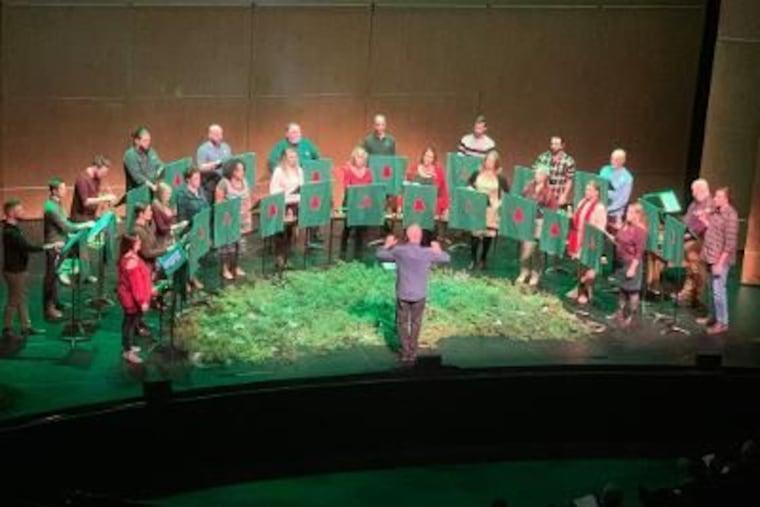Twelve works premiered in ‘Carols After a Plague’ concert from The Crossing choir
The Crossing, the Grammy-winning choir directed by Donald Nally, gave its audience much to hear and think about with works that acknowledged our revised COVID reality,

Planned as a celebration of this post-lockdown Christmas, The Crossing choir’s all-new 12-composer program titled Carols After a Plague arrived in sad conjunction with the latest outbreak and performance cancellations increasing by the day.
However the world shakes down, this Grammy-winning choir directed by Donald Nally gave its audience much to hear and think about with works that frankly acknowledged our revised reality but with a kind of humanitarian awareness revealing manifestations of love behind the troubles we’re seeing. All pieces were well worth hearing, the less immediately-communicative ones being buoyed by the Sunday concert’s overall package.
Though the program was presented Friday by Penn Live Arts at the Annenberg Center, the Sunday concert had an atmosphere of its own at the choir’s traditional home at Presbyterian Church of Chestnut Hill with flickering candles crowding every windowsill and choir members handing out Christmas cookies (good ones) in the lobby at the end.
Words played an unusually direct role in these works commissioned for the occasion, and they came from many unlikely sources that held conflicting, simultaneous emotions in balance. LJ White’s “A Carol Called Love” drew on Alex Dimitrov’s poem-in-progress listing all of what he loves about his life, such as “I love how everything can happen & nothing can change.” Some 32 lines were quoted, sung with voices in a radiant bedrock of chanting with individuals breaking out of that with appropriate lyricism.
“Everything passes, Everything is connected” was the title and the refrain in Samantha Fernando’s self-authored text, set to music that began simply and wandered into dissonance. Nina Shekhar’s “y-mas” took brief quotes from secular Christmas songs, seemingly put them into a blender and positioned them in a fun, disparate musical collage. Joseph C. Phillips Jr. explored the more grassroots level of the pandemic with “The Undisappeared,” describing the experience of bonding with neighbors he never previously knew existed.
Mid-20th-century British choral sounds were a launching pad for 21st century outbursts expressing the frustration of unchanging days in Leila Adu-Gilmore’s “Colouring-In Book.” A particularly exclamatory passage by Walt Whitman was given radically splintered treatment in “Rising Stars” by Edith Canat de Chizy to give each line maximum emphasis. “Shining Still” by Vanessa Lann had much of its shine concentrated in lower-voice writing woven throughout the piece that suggested the sort of jazz doublebass ostinato that’s so often used to knit together otherwise complex music making.
Formal religion was represented: Shara Nova’s “Tone-policing,” in some of the most straightforward choral writing of the concert, had words reverently referring to “Holy Black Madonna” with music that had the “Silent Night” melody drifting about in the background with an air of nostalgia. In “Exodus,” Alex Berko quoted the Book of Exodus — “will you protect me” — with an intoxicating wave of choral sound, ending with a sense of doubt and ambivalence heard so often in the concert in the quietly sung words “nevertheless I pray.”
The concert’s benediction was Viet Cuong’s “Still So Much to Say” with life seeming to slowly ebb out of the music with David Ferry’s words about words left unsaid when the mythical Eurydice dies for the second time.
Two composers chose to have no text at all. Mary Jane Leach’s “Alone Together” beautifully lived up to its title with sections of the choir seeming to call out to each other from nearby. Tyshawn Sorey’s “Requiem for a Plague” might seem to have been overtaken by the history of the past week. But this work may be the most timeless of the concert, with its wordless clouds of microtonal textures, partly cloudy with occasional hints of light, probably joining hands with whatever you might be feeling next week or any other week.
Revisiting this concert’s music will be possible: The Crossing makes studio recordings of its repertoire and maybe, just maybe, the plague will be in the past tense by the time it’s released.